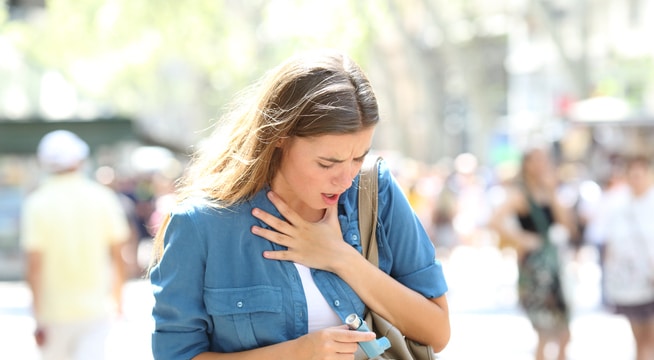Asthma & Shortness of Breath
Conditions
•
Jul 19, 2019
Reviewed by: Jeffrey Peebles, M.D

Having an asthma attack can be a terrifying experience, especially when it’s your first one and you don’t fully understand what’s going on. In addition, there can be instances when a person simply thinks they are fatigued, “out of shape,” or tired, when in reality, they’re experiencing the kind of shortness of breath that signals an asthma attack.
What is Asthma?
Asthma is a chronic condition that affects your lungs and airways. When a person gets an asthma attack, their airways become extremely inflamed, making it difficult for air to reach your lungs. If not treated adequately, it can be life-threatening. However, millions of people have learned to recognize and manage symptoms of asthma successfully.
When Shortness of Breath is Really an Asthma Attack
There are situations when shortness of breath has more to do with having allergies or getting used to a new exercise regimen. Even simple levels of exertion (like going up a flight of stairs) may result in shortness of breath when a person leads a sedentary lifestyle. Yet, gasping for air is of relatively short duration, and the person will start breathing normally again minutes after feeling short of breath.
That said, if you’re having an asthma attack, the episode will go hand-in-hand with several other symptoms.
Additional Warning Signs of an Asthma Attack
In addition to feeling like you can’t get enough air into your lungs, an asthma attack has the following symptoms:
- Breathing quickens
- Wheezing
- Chest tightening
- Coughing
Attacks can vary in severity, so while a person may feel short of breath for only several minutes, the experience may last for hours for someone else.
The condition may feel worse for people who already have an underlying illness of their respiratory tract, such as bronchitis, pneumonia, anxiety, Chronic Obstructive Pulmonary Disease (COPD), or lung cancer.
When to Worry About Shortness of Breath
Experiencing shortness of breath may be cause for alarm if in addition, you’ve noticed any of the following red flags:
- Dry, painful cough
- Chest pain
- Attacks always start after exercising
- It’s harder to breathe when lying down
- Swollen ankles or feet
- Paleness
- Feeling exhausted all the time
*All of these symptoms are chronic
24-Hour Emergency Room Services in Colorado Springs and Texas
If you’re not feeling well, we can provide the care you need. If you have questions or need immediate treatment, your nearest Complete Care location is ready to help, no matter the time of day or night. We offer a variety of services to help you and your family in your time of need. No appointments are necessary.
Find the Complete Care location nearest you.
